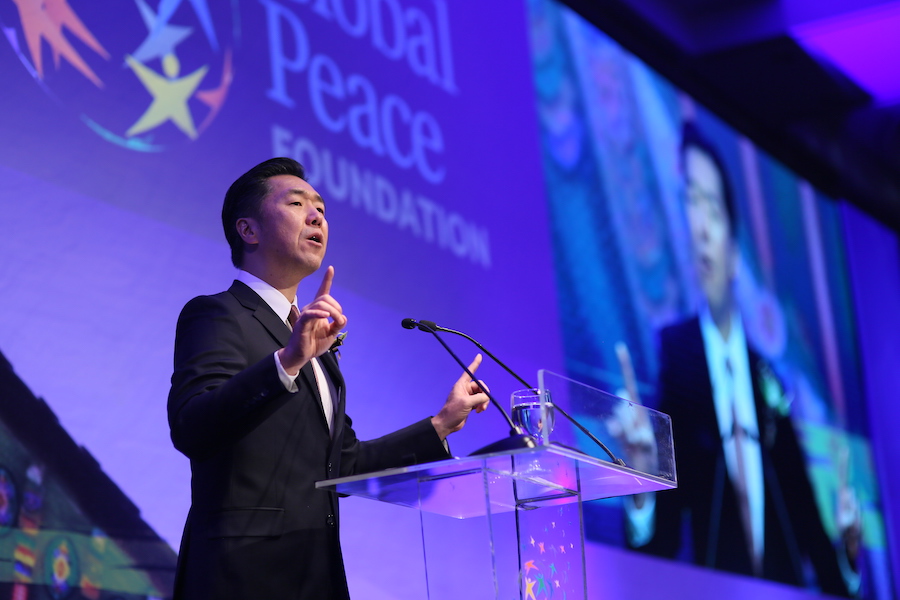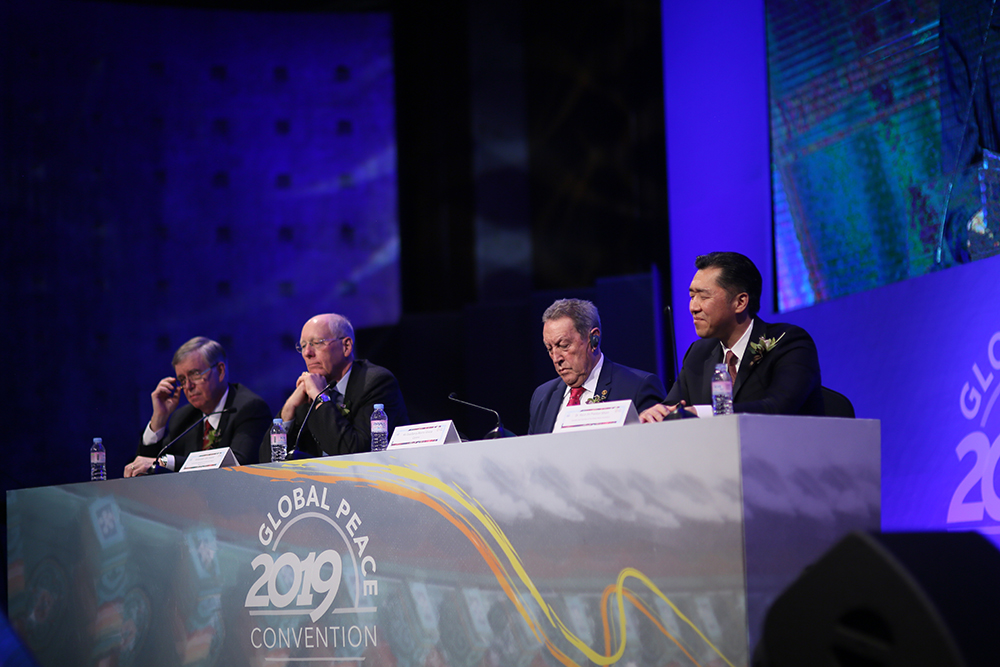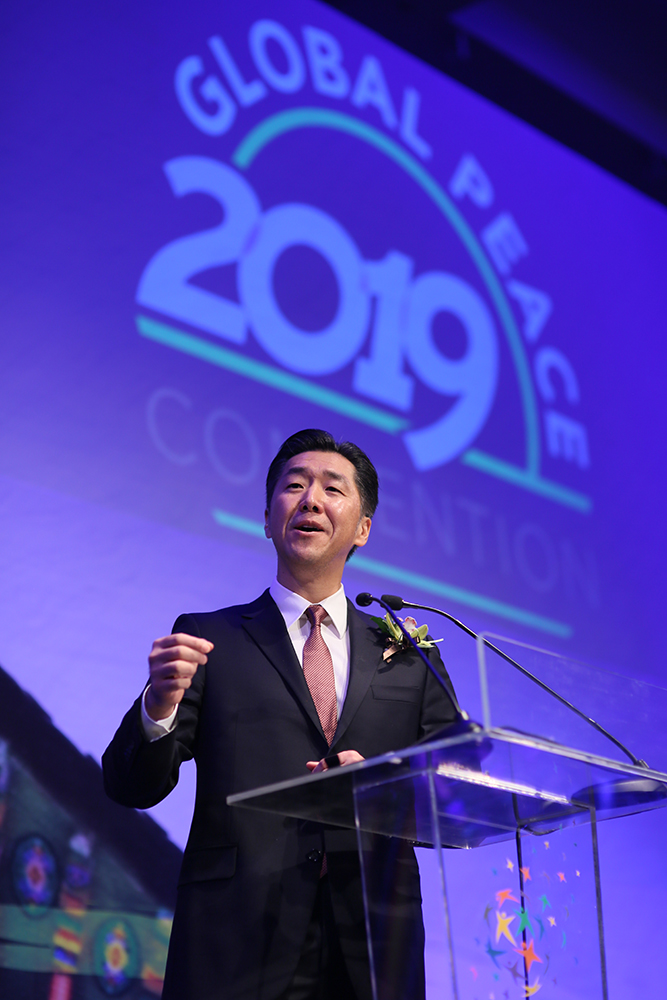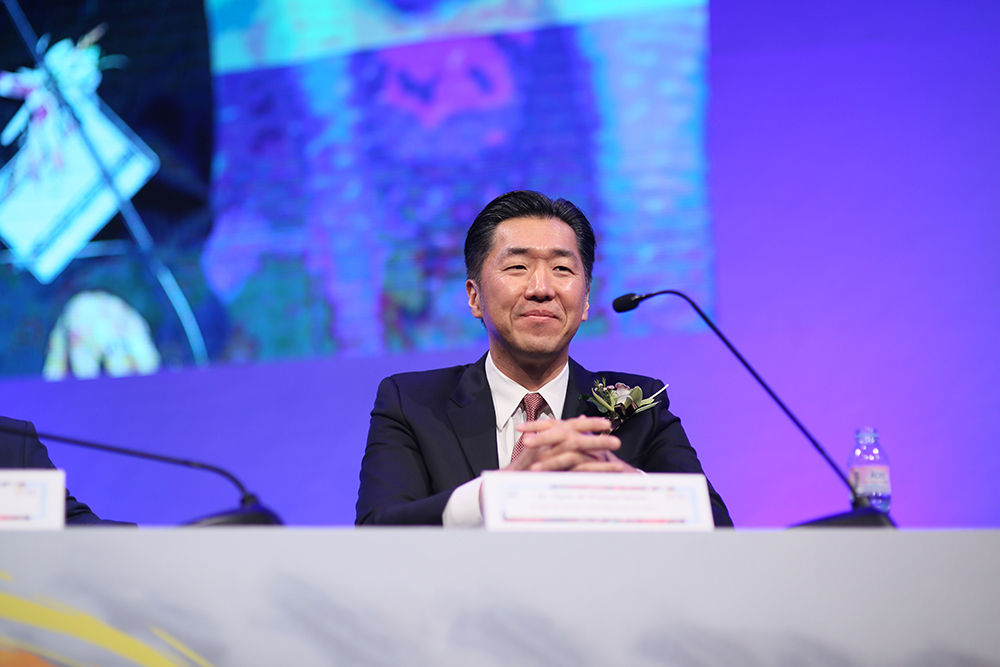The following article was written by reporter Hong-Keun Song for Korea-based Magazine Shindonga, featuring Dr. Hyun Jin P. Moon, author of Korean Dream: A Vision for a Unified Korea. Calling on the United States administration and policymakers to look toward the goal of unification of the peninsula instead of the narrow goal of denuclearization, Dr. Moon presents the Korean Dream as a way forward to bring peace and stability not only in Korea but also the entire region and world.
Dr. Hyun Jin Moon, Founder
 “The unification process should start by recovering the Han people’s identity which was formed by a unique and historic tradition. The Hongik Ingan spirit—that is, the spirit to live for the benefit of and in service of humanity—is our people’s founding principle. Humankind’s universal values are contained within the Hongik Ingan ideal. We have to establish a vision for
“The unification process should start by recovering the Han people’s identity which was formed by a unique and historic tradition. The Hongik Ingan spirit—that is, the spirit to live for the benefit of and in service of humanity—is our people’s founding principle. Humankind’s universal values are contained within the Hongik Ingan ideal. We have to establish a vision for
In his keynote address at the 2019 Global Peace Convention on February 28, he stated, “The Hongik Ingan spirit was a motivating ideal for the Independence Movement 100 years ago. The March 1st Movement inspired other national movements for independence and civil rights movements throughout the 20th century.”
“The philosophical ideal of Hongik Ingan is shared by all Koreans, North
He added:
“The names of both nations
Appalled by Korea’s exclusion
 I met with him on February 27th, the first day of the US-North Korea summit in Hanoi, Vietnam.
I met with him on February 27th, the first day of the US-North Korea summit in Hanoi, Vietnam.
“At this moment, Korea is excluded from the events in Vietnam. The US and North Korea are holding bilateral talks in Hanoi at this very moment. But where is (South) Korea? In the big picture, where is Korea? Korea is not there. Korea has been excluded. People should be appalled by Korea’s exclusion from the talks considering that 50 million of the 75 million people that populate this peninsula live in the South.”
Dr. Moon predicted that the US-North Korea talks would result in “No Deal.” The Hanoi Summit ended in a similar line to what he predicted.
“When Americans learn that they were tricked by North Korea, the talks will end with no deal. There is no point in talking of a ‘Big Deal’ or a ‘Small Deal’ because there will be no negotiation
He asked, “How many people think Kim Jong-un will give up his nukes through negotiations?”
“I want to ask Koreans if they think North Korea will give up its nuclear program. I do not believe that Kim Jong-un will give up nukes through a bilateral agreement. The United States has to revise its strategy towards the Korean peninsula. They should put unification on the table when building their strategy, rather than focusing on the narrow goal of denuclearization. For the last 30 years, ever since George H.W. Bush’s government, the US has advanced a policy centered on the fragmentary and narrow issue of denuclearization. The United States should provide a strategic framework that can bring about geopolitical change, as it did when it advanced the Marshall Plan for the reconstruction of Europe after World War II or similar to Douglas MacArthur’s reconstruction of Japan.”
He wrote the following in a February 22, Newsweek publication:
“With the second summit between President Donald Trump and Chairman Kim Jong-un of North Korea happening at the end of the month, it is time to consider whether narrow bilateral negotiations on denuclearization are likely to produce results. If recent revelations are indicators of the North’s intent, the prospects are not hopeful. The only reason for this summit is the lack of substantial progress on denuclearization from the first meeting in Singapore last June, whose sole result was to relieve the global pressure that the Trump administration was able to put on Kim Jong Un.
There are two fundamental assumptions in the current U.S. approach. First, it assumes that denuclearization could be narrowly negotiated with Kim Jung Un. To the Kim regime, its nuclear weapons program is not only a guarantee to its
He states, “If the U.S. was to remove its troops as part of its narrow bi-lateral deal with North Korea, it will seal the deal for the North to make moves to secure its ultimate prize—South Korea.”
Appeal to the anti-Americanism and anti-Japanese elements
 “North Korea has not abandoned the dream of Kim Jong-un’s grandfather, ‘Eternal President’ Kim Il Sung, of a united peninsula under the ideology of the North. They have a larger strategic view that wants to reap the benefits of the South Korean economy married with their nuclear power. And what they can no longer achieve by force they will seek to achieve by geopolitical maneuvers and exploiting the hyper-divisive ideological divide in South Korea. They will appeal to the anti-Americanism and anti-Japanese elements of the progressive Left in the current South Korean administration under the banner of ‘Korean self-determination.’ This will slowly erode the fragile alliance in Northeast Asia between the U.S., Japan
“North Korea has not abandoned the dream of Kim Jong-un’s grandfather, ‘Eternal President’ Kim Il Sung, of a united peninsula under the ideology of the North. They have a larger strategic view that wants to reap the benefits of the South Korean economy married with their nuclear power. And what they can no longer achieve by force they will seek to achieve by geopolitical maneuvers and exploiting the hyper-divisive ideological divide in South Korea. They will appeal to the anti-Americanism and anti-Japanese elements of the progressive Left in the current South Korean administration under the banner of ‘Korean self-determination.’ This will slowly erode the fragile alliance in Northeast Asia between the U.S., Japan
His view is
“To protect Kim Jong-un’s regime goes against American values of freedom and human rights. Yet, the US has expressed its intention to give up such values for the denuclearization of North Korea. By focusing on the impossible goal of a complete and verifiable denuclearization policy, the US is overlooking a much larger issue. These developments have the potential for grave geopolitical consequences. I am sure that some of what is being offered to North Korea includes ending the Korean War and the withdrawal of US troops. What does it mean for the US nuclear umbrella to not protect Korea? Koreans should focus their attention on US-North Korea negotiations.”
Dr. Moon is the author of “Korean Dream: A Vision for a Unified Korea.” In his
A Vision for a Unified Korea
“I repeatedly emphasize that the most important question is, ‘What kind of unification should we have?’ What I’m saying is that asking, ‘What kind of nation
He often quotes Genghis Khan saying, “If one person has a dream, it is but a dream. But if everyone shares that dream, it becomes reality.”
“Genghis Khan’s tribe was one of the weakest tribes in Mongolia, but their dream of ‘one world under one heaven’ was profound. Everyone shared that dream and built the largest empire in human history. The same is true of the American Revolution. Poor farmers and a few small shopkeepers rebelled against the British Empire. The dream of building a nation that guarantees our God-given human rights led to the founding of a nation which today is a superpower. The ideal revealed through the Hongik Ingan spirit is the same as the dream of the Mongol empire, and the same as the aspiration that led to the making of the United States. The patriots of the March 1st Movement had the desire to build a ‘unified, independent, free’ state. The unification of Korea should be peaceful and in accordance with the ideals and principles declared by our ancestors. Our patriot ancestors wanted to build a new nation based on the culture, history, and values shared by Koreans.”
To conclude, he said:
“If the process of unification led by Korea proceeds within a new paradigm rooted in our historical aspirations and identity, then no country will question it. The future of the Korean people is very bright. Most economic research results are positive. A unified Korea will become one of the world’s top 5 economic powerhouses. “

